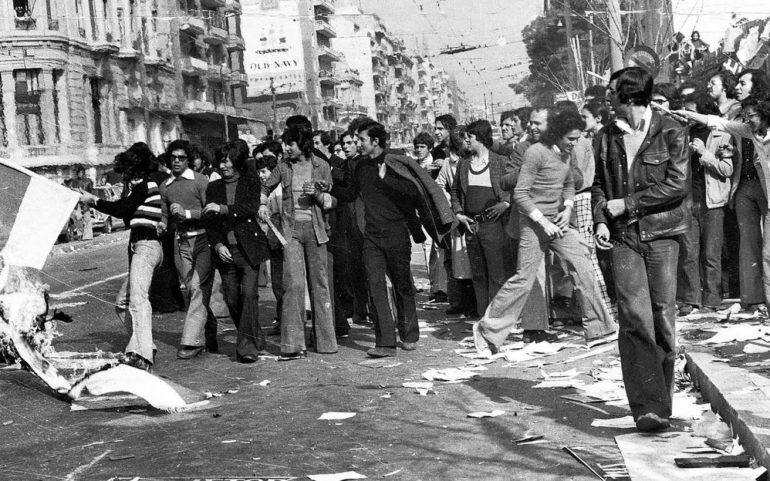One of the priorities of the Metapolitism was to bring to justice those responsible for his massacre Polytechnic.
So, at nine o'clock on the morning of Thursday, October 16, 1975, in the specially designed room of the Korydallos Prison where the Aprilians had previously been tried, sat 32 members of the regime for crimes committed according to the indictment during the Polytechnic uprising (November 15-17 1973) but also in the days that followed, after a martial law had been declared with the consequence that several citizens lost their lives in the next twenty-four hours, not only around the university institution but also in remote areas of Athens by "conscientious" police officers. EAT-ESA.
The trial lasted two and a half months, with meetings being held all working days of the week until New Year's Eve 1976.
What was heard from the approximately 290 witnesses (237 indictment and 47 defense) shocked both the president of the five-member Court of Appeal, Ioannis Kousoulos, the prosecutor of the court, Nikolaos Ganosis, and the other judges, as well as the audience that had filled the courtroom.
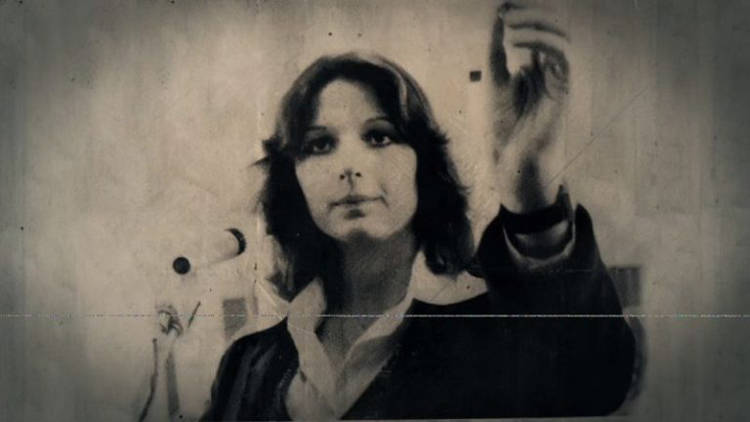
A young girl, the Irini Moustaka, testified that in November 1973 she was a high school student. On Friday the 16th of that month she was returning from the tutoring center located in the center of Athens to her house in Kifissia.
He went to get the electrician but found that the routes were not running. She finds a telephone booth in Victoria Square and contacts her father to tell him that he will be late. Her father advises her to stay where she is until he comes to pick her up. As soon as the girl comes out of the room, she feels something warm piercing her cheek.
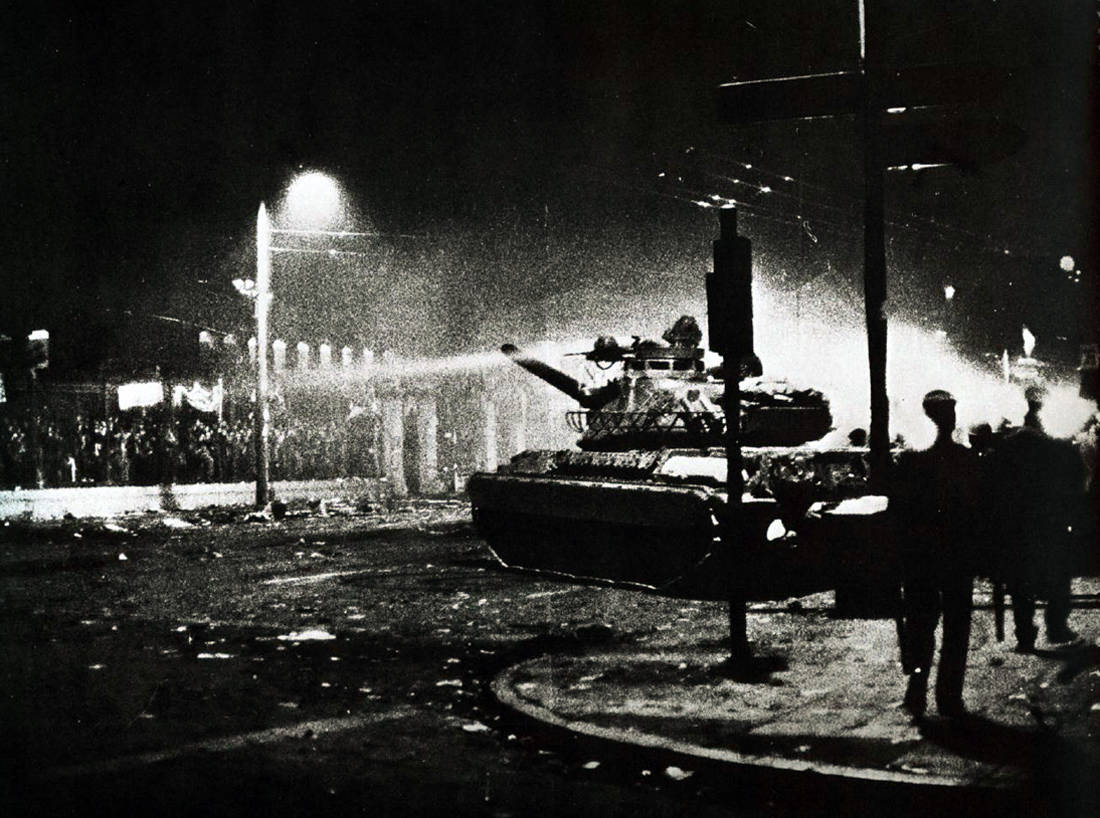
Her face is flooded with blood. A sniper had just shot her from the roof of a nearby building. "I felt a sweet sensation in my cheek and then a buzz in my mouth as if a bomb had exploded. "And I see a jet of blood springing from my mouth," he will say later. The bullet had pierced her cheek, cut her tongue and nailed it to her jaw. He lived by a miracle. While he was speaking in court, he was holding the bullet in his hand, which he was pointing at the headquarters. The ballistic examination showed that he had left a weapon of the Greek Army.
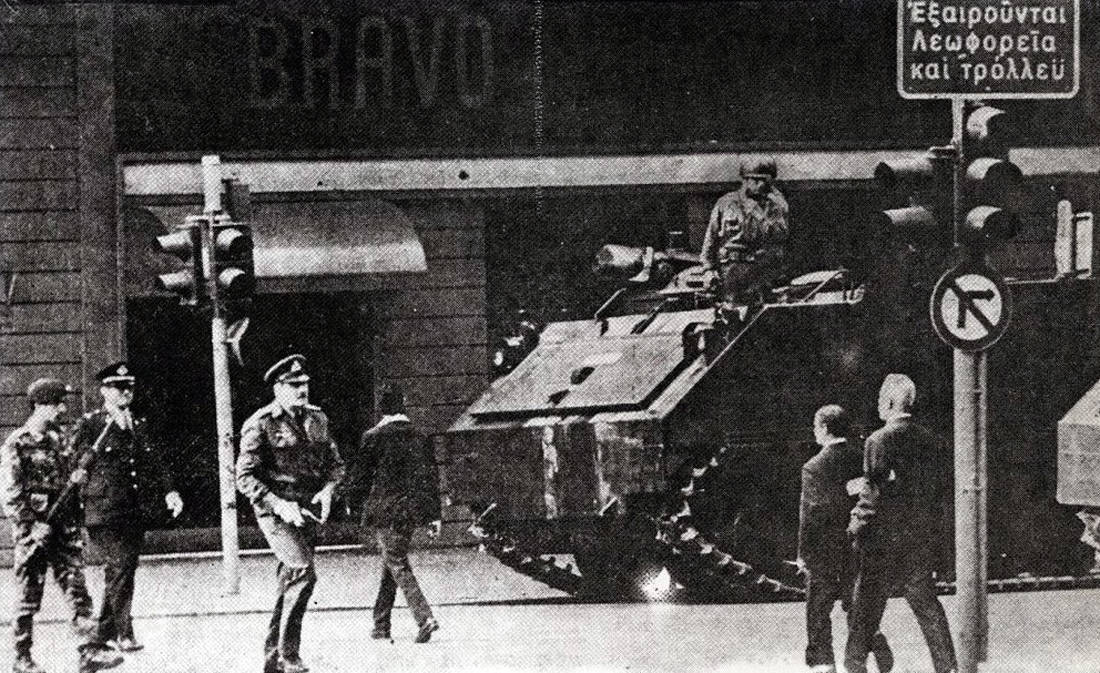
The testimony of 21-year-old Antonis Agritelis, the brigadier general's personal driver, was also shocking. Nikolaou Ndertili, one of the leaders of the junta. In the affidavit submitted to the court, he stated that "on Friday afternoon (November 16, 1973) I picked him up from his house and transported him by jeep to the Athens Police Department at 10 Stadiou Street, around seven in the evening. . At 10 o'clock, Dertilis came out with a senior police officer and they left. I did not understand when they returned.
At 4 or 4:30 in the morning on Saturday (November 17) I picked up Dertilis and transported him from ASDEN to the Polytechnic by jeep. I stopped near the damaged gate, Ndertilis came down and talked to a police officer. Suddenly a commotion and voices were heard towards the intersection of Patision and Stournara. I noticed that police officers were beating a young man. Suddenly he managed to detach himself from the police. Then Dertilis, who had just noticed the incident, took his revolver out of his jacket and fired without much thought.
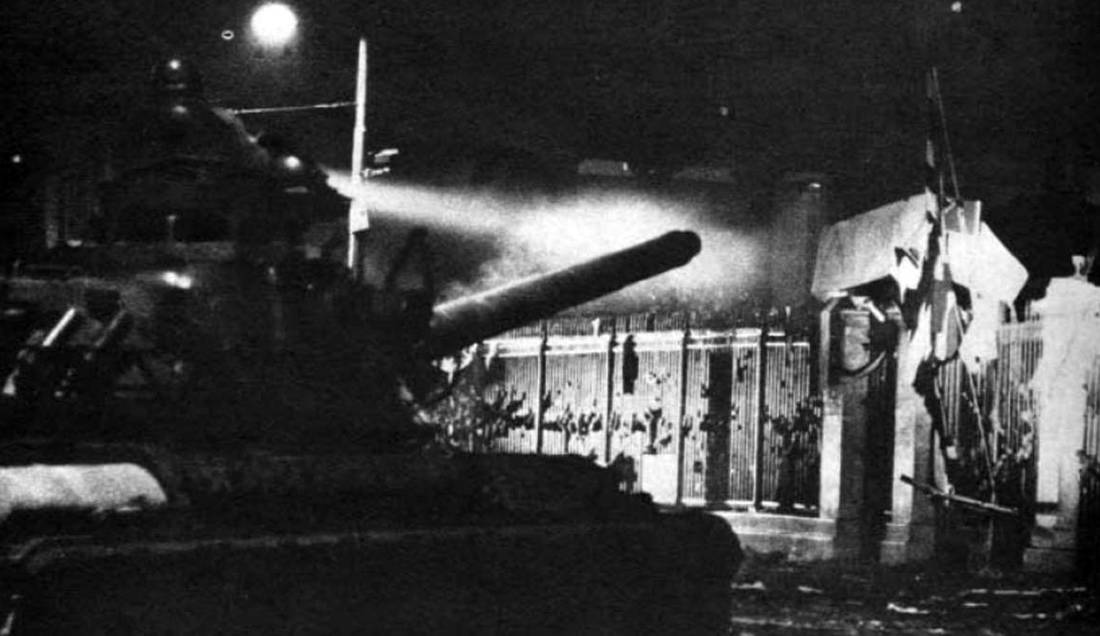
The young man fell like a chicken. He stayed on the spot right at the intersection of Patision and Stournara, towards Omonia. I imagined she threw him at his feet and waited for him to move. But when I saw a pool of blood forming and a small white pool of minds, I realized that he had shot him in the head and was already dead. Then, as if nothing was happening, he got into the jeep and slapped me on the back, saying "do you admit me? Forty-five-year-old man and at once I hit him in the head ". I had lost them and I was terribly upset and scared.
We continued to Patision and arrived at the Museum. There, a trolleybus officer was blocked and the police shouted and pushed him. Dertilis got out of the jeep, stuck his revolver in the man's stomach and threatened him that he would kill him if he did not disappear.
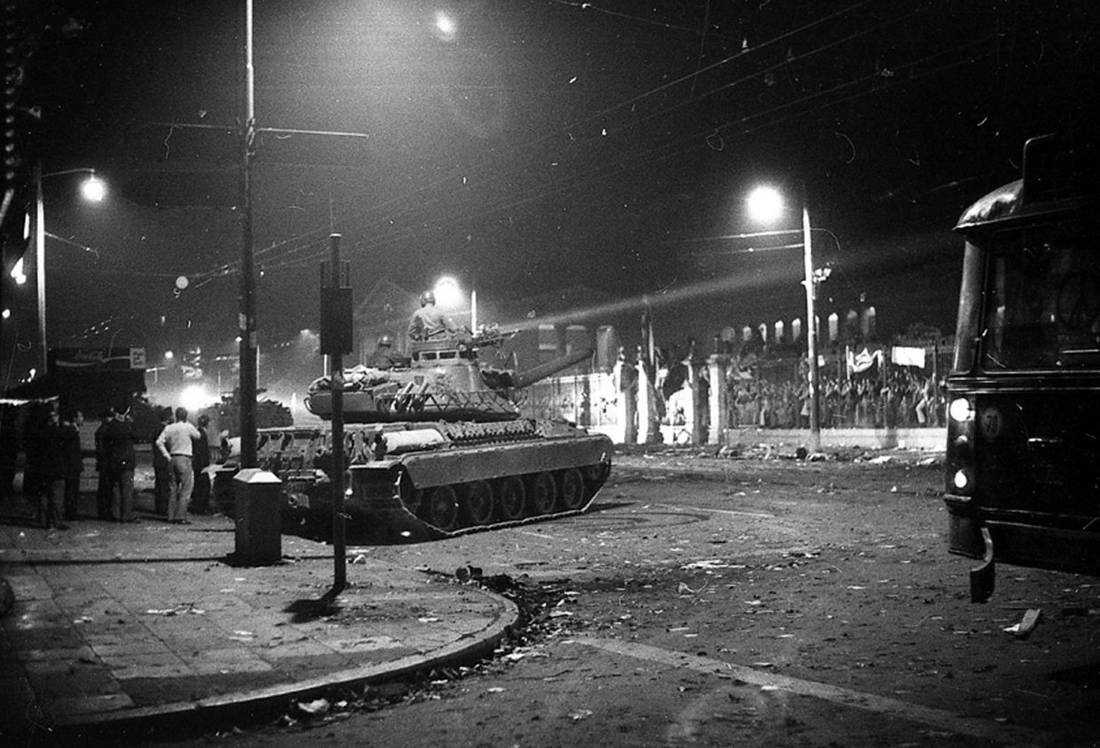
Then we proceeded to OTE where there were several citizens. Dertilis pulled out his revolver and started firing without being able to tell if anyone had been hit. From OTE we went back and reached Chafteia just outside it. While we had not stopped yet, Dertilis realized over the Alaska Cinema citizens who had been excluded. He immediately got out of his car and ordered the LOKatzides to attack and catch them. He himself gave orders with the revolver in his hand, saying: "Weigh in the flesh, will five old children do to us what they want?" After a while, the LOKatzides got down about thirty people and put them on trucks and took them.
From that point we left and went to GD Septemvriou and Marni streets, in a service of the Gendarmerie. I realized this, because as soon as Dertilis came down, the Gendarmerie ran and welcomed him. But he said to them, as if arguing with them, "What are you afraid of?" Weigh in the fish, I made the beginning. ". Then I realized that Dertilis' act had been learned. After days, Dertilis asked me: “Do you remember the one I shot at the Polytechnic? Well, he finally saved her. "
Of course, his purpose was obvious, he wanted to soften the terrible impression he had made on me with his cold-blooded murder and to forget him. But I will remember this terrible event for the rest of my life. I pretended to believe him but I had no doubt that the young man was dead. Which I read later in the newspapers. After several days, I was expelled with an unfavorable transfer to Polykastro. Dertilis called me and said: "My child, you must not forget one thing, that in our Service everything we hear and what we see remains for the Service, we do not say that to our mother either." I understood what he meant. My transfer to Polykastro was because I was a personal driver of Dertilis. However, they justified it to me that I had broken the mirror of his car and as a punishment I was taking this transfer.
I would also like to add that during the events of the Polytechnic, Dertilis constantly said to anyone he met, "weigh in on the search". He even said to some others: "When you see four people, kill one and put the three in the truck."
Dertilis's defense attorney, however, did not accept the testimony of the young Antonis Agritelis, claiming that he was never Dertilis's personal guide. To prove that he knew the coup leader well, he began giving details: "He was sending me to buy him Dunhill cigarettes and to repair the Ronson lighter in a shop in Bucharest." In fact, there was a person who located the lighter repair shop and actually found proof of repair in the name of Dertilis. This person was Stelios Logothetis, later mayor of Nicaea and then of Piraeus.
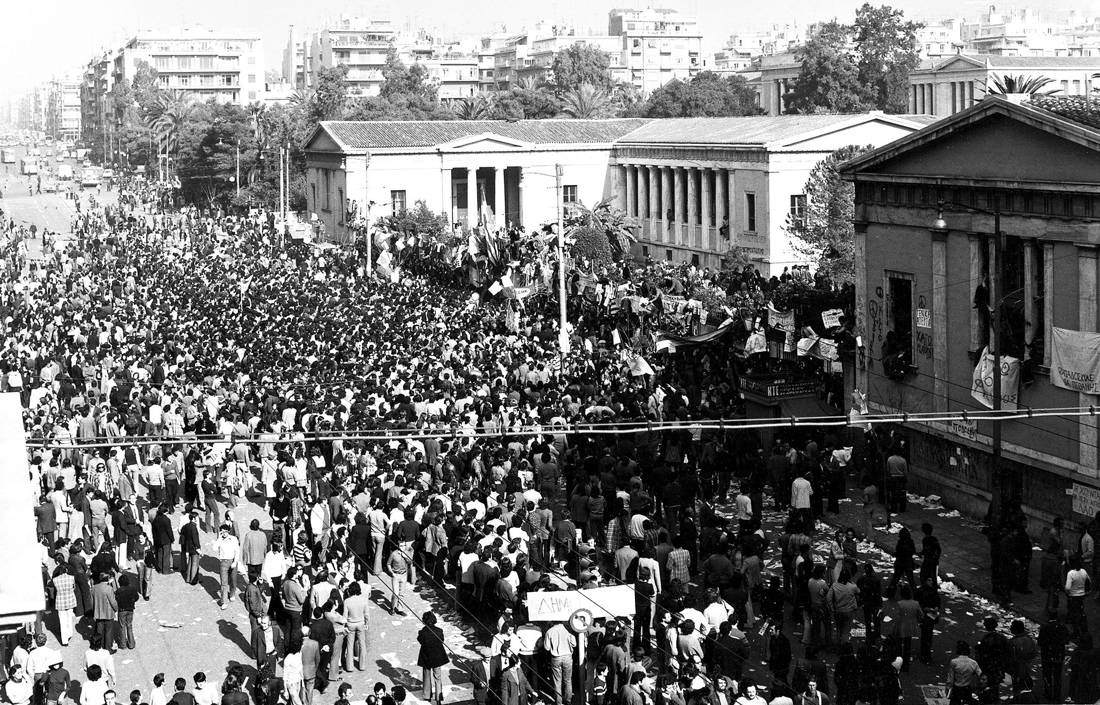
Another witness noted that on Saturday, November 17, 1973, "at 10 o'clock in the morning, tanks were passing by Patision Street and OTE employees, working in the new building, hurried to the windows to see the tanks. Then they saw, as witnesses Pan testified at the hearing. Asderakis, Em. Maroufidis, Ioannis Hadjichristofis and Al. Bernardos, that on the roof of the building on Patision Street (where the OTE was based) three to four soldiers had been shot and at their head was a young officer in a helmet, tall, and dark in a campaign uniform, who with the revolver in hand and on the roof wall shoots down. No demonstrations took place at that time. "
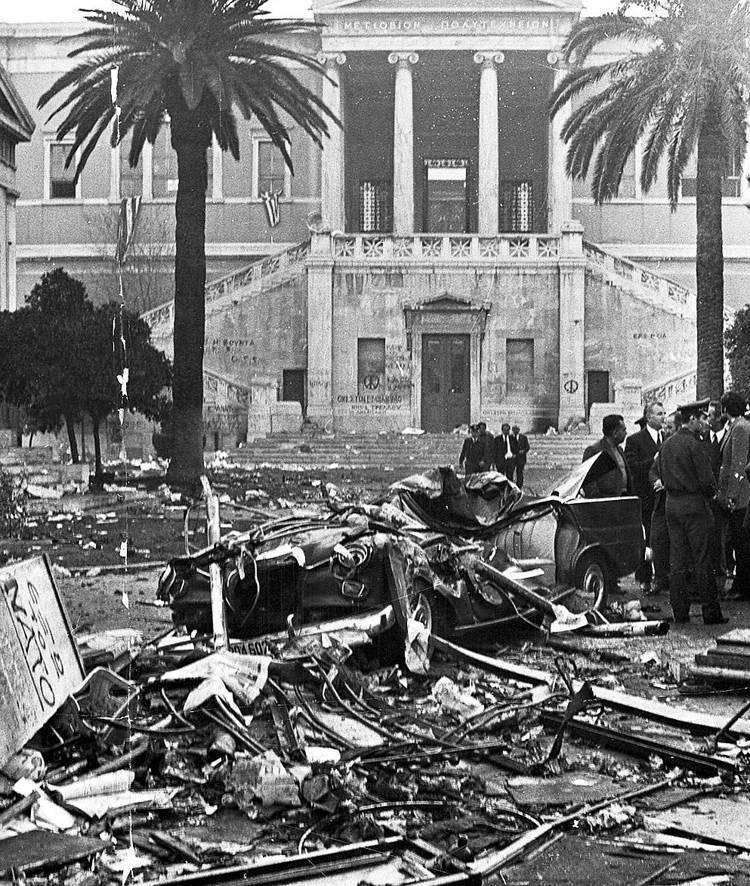
The young Theodora Famelou, for her part, described in court the moment she learned about the murder of her husband. He had gone to the Regulatory Center for Patient Screening on Mesogeion Avenue (where the general state hospital "Georgios Gennimatas" is located today) and was desperately looking for him.
"I showed the identity of my husband I was holding and asked if they knew anything about his fate," he says. They removed three reference glues with the names of the dead and wounded. His name was not in it. At that moment a car arrived and a middle-aged policeman shouted: "Too bad, we have a husky tall lad inside and he is killed." I approached. I asked them if she was wearing a wedding ring. They brought me a wedding ring with my name written on it. Understood. I collapsed. My husband was the dead lad. He had been shot in the temple. What his head was bruised. A policeman told me: "Make your cross because we did not throw him and the others into the pit…".
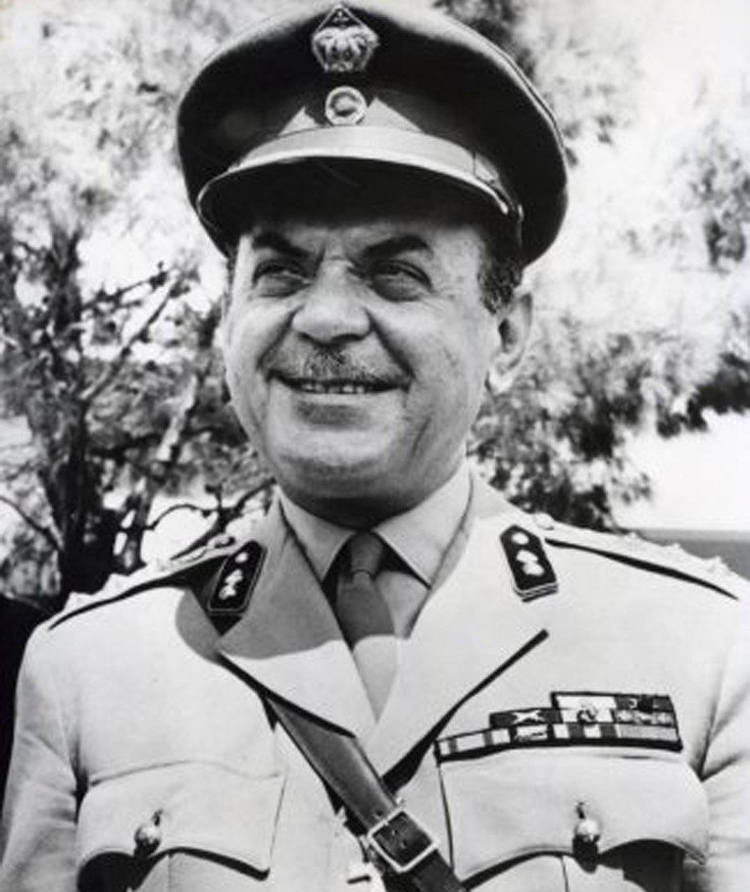
As expected, many of the testimonies were shocking, with court president Ioannis Kousoulos admitting several years later in an interview that "many times I cried and covered myself so that they would not take me by surprise". His assessment is that the coup was led from the beginning by Dimitrios Ioannidis, "a dark guy who moved the threads from the basement" (he also had the nickname "invisible dictator"), who had overthrown Georgios Papadopoulos after the event.
Nevertheless, the latter tried in every way to prove that he was still the leader. In this context, he objected to the jurisdiction of the court to judge his actions, claiming that as… President of the Republic he was "irresponsible to the authorities" and therefore could not speak to anyone.
The court rejected his objection on the very logical grounds that his government had come after a coup and was therefore illegal. Therefore, it was not protected by any legislation.
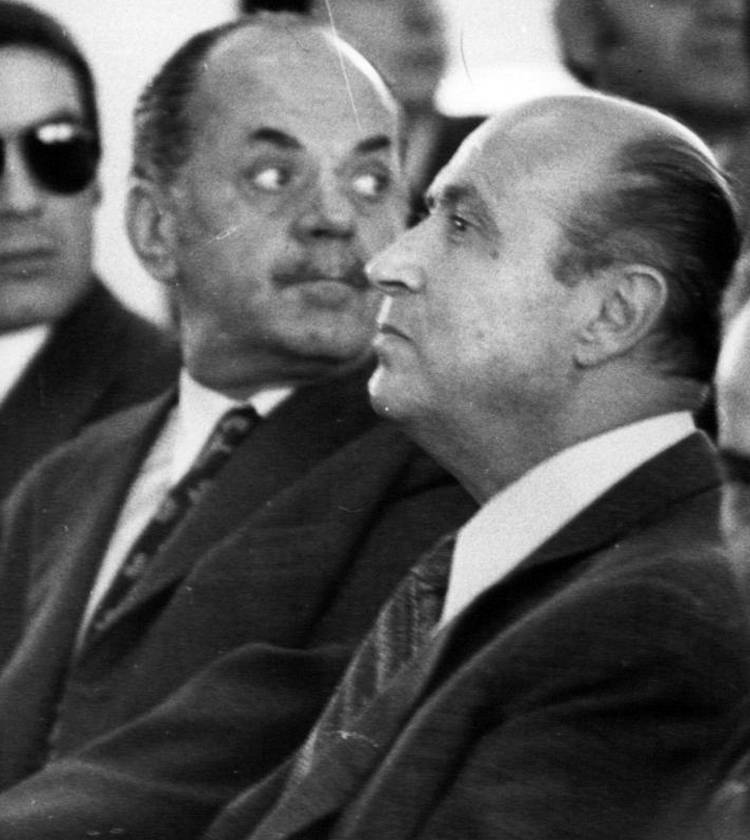
Of the 32 accused, 20 were convicted and the remaining 12 were acquitted.
specifically:
- Dimitrios Ioannidis (as head of the military police - ESA at the time of the uprising) was sentenced to 7 times life imprisonment for intentional homicide in the same number of intentional homicides, 25 years in prison for incitement to 38 counts of attempted homicide and incitement to commit crimes, of rights. Hearing the sentence, he ironically asks to be placed in the executive branch.
- George Papadopoulos (as incumbent dictator at the time of the uprising) was sentenced to 25 years in prison for conspiracy to commit premeditated murder and attempted murder, as well as a ten-year deprivation of his political rights. After the announcement of the decision, he appeared once again provocative, sending reporters who approached him in order to extract a statement from him.
- Retired lieutenant general Stavros Barnabas was sentenced to 3 life terms for incitement to an equal number of premeditated homicides and 25 years in prison for incitement to 17 counts of attempted homicide and incitement to commit crimes. He too was permanently deprived of his political rights.
- Retired Brigadier General Nikolaos Ndertilis was sentenced to life imprisonment and permanent deprivation of his political rights for murder with intent of passing through the intersection of Patision and Sournari streets, student Michalis Myrogiannis. She had shot him in the head with his service revolver, without any hesitation.
- Retired lieutenant general Konstantinos Mavroidis, then leader of ASDEN (Supreme Military Administration of the Interior and Islands) was sentenced to 25 years in prison and 7 years of deprivation of his political rights, for simple complicity in six premeditated murders and 37 attempted murders. His court recognized the mitigation of his previous honest life.
- Retired general Dimitrios Zagorianakos, then commander of the Armed Forces, he was sentenced to 25 years in prison and 7 years of deprivation of his political rights, for simple conspiracy to commit murder and attempted murder. The court also recognized in him the mitigation of the previous honest life.
- Retired Lieutenant General Pantelis Karagiannis, A former deputy head of the Gendarmerie, he was sentenced to 25 years in prison by merger and 10 years deprived of his political rights, for simple complicity in three homicides and 17 attempted homicides.
- The former reserve lieutenant Ioannis Lymperis, was sentenced to 25 years imprisonment by merger and 8 years deprivation of civil rights for two premeditated homicides and one attempted homicide.
- The policeman Athanasios Stavrakis, he was sentenced to 10 years in prison and 5 years of deprivation of his political rights, for attempted murder. The relief of the former honest life was also recognized in this person.
- Retired Lieutenant General Michael Roufogalis, then commander of the KYP (State Intelligence Service) was sentenced to 3 years in prison for incitement to commit crimes and misdemeanors.
- Retired lieutenant Michael Gounelas, head of the chariot that invaded the Polytechnic on the night of November 17, 1973, was sentenced to 18 months in prison for inciting bodily harm to student Pepi Rigopoulou, as well as for "damaging things that serve the common good."
- The private employee Dimitrios Pimbas, a former agent of the KYP, was sentenced to 10 months in prison for inciting crimes and misdemeanors, while the convict was granted the mitigation of sincere repentance.
- Finally, twelve defendants were sentenced to lighter sentences (from 5 months to 10 years imprisonment) for various categories, mainly for incitement to dangerous bodily harm. For sentences of less than one year there was the right of redemption. It should be noted that in February 1977 the case was heard in the second instance and this time most of the minor persons in the trial were acquitted.
* George Sarris is a journalist - member of ESIEA, honored by the President of the Republic with the Ath. Botsis Award for the objective and complete presentation of historical political issues
